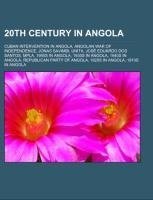
20th century in Angola
Source: Wikipedia. Pages: 34. Chapters: Cuban intervention in Angola, Angolan War of Independence, Jonas Savimbi, UNITA, José Eduardo dos Santos, MPLA, 1950s in Angola, 1930s in Angola, 1940s in Angola, Republican Party of Angola, 1920s in Angola, 1910s... Viac o knihe
Produkt je dočasne nedostupný
13.73 €
bežná cena: 15.60 €
O knihe
Source: Wikipedia. Pages: 34. Chapters: Cuban intervention in Angola, Angolan War of Independence, Jonas Savimbi, UNITA, José Eduardo dos Santos, MPLA, 1950s in Angola, 1930s in Angola, 1940s in Angola, Republican Party of Angola, 1920s in Angola, 1910s in Angola. Excerpt: In November 1975, on the eve of Angola's independence, Cuba launched a large-scale military intervention in support of the leftist liberation movement MPLA against United States-backed invasions by South Africa and Zaire in support of two other liberation movements competing for power in the country, FNLA and UNITA. Following the retreat of Zaire and South Africa, Cuban forces remained in Angola to support the Angolan government against the UNITA insurgency in the continuing Angolan Civil War. In 1988, Cuban troops intervened a second time to avert a military disaster in a Soviet-led FAPLA offensive against UNITA which was supported by South Africa, leading to the Battle of Cuito Cuanavale. This turn of events is considered to have been the major impetus to the success of the ongoing peace talks leading to the New York Accords after which Cuban and South African forces withdrew from Angola while South West Africa gained its independence from South Africa. Cuban military engagement in Angola ended in 1991. In addition to the Cuban military, from 1976 to 1991, 430,000 Cuban foreign aid volunteers served in Angola. At one point, two-thirds of all doctors in Angola were Cuban. The Carnation Revolution of 25 April 1974 in Portugal took the world by surprise and caught the liberation movements in its last African colonies unprepared. After smooth negotiations Mozambique's independence was granted on 25 June 1975, but Angolan control remained disputed between the three rival liberation movements: MPLA, FNLA and UNITA in Angola-proper and FLEC (Cabinda Independence Organisation) in Cabinda. Until independence the liberation movements' priority lay in fighting the colonial power and they initially had no clear alliances. With the disappearance of Portugal as the their common foe, ethnic and ideological rivalries moved to the fore. Fighting between the three already broke out in November 1974, starting in Luanda and quickly spreading across all of Angola. The new leftist Port
- Vydavateľstvo: Books LLC, Reference Series
- Formát: Paperback
- Jazyk:
- ISBN: 9781157620440


 Anglický jazyk
Anglický jazyk 



 Ruský jazyk
Ruský jazyk 





